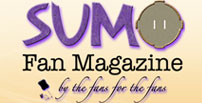| Brothers in Sumo – part one Brian Lewin |
 |
NHK & the Ozumo
English Broadcast
Mark Buckton
A visit to NHK, years of watching the show and the opinions of our Ed-in-Chief
Hanging With the Rikishi
Barbara Ann Klein
Barbara Ann Klein recounts her experiences with the “boys” in a pictorial diary series
| Rikishi of Old Joe Kuroda |
 |
Sumo Exhibit at the
Edo-Tokyo Museum
Barbara Ann Klein
SFM’s Editor takes in the exhibit celebrating 80 years of the Japan Sumo Association at this famous Tokyo museum
| Heya Peek John Gunning |
 |
| SFM Interview Dave Wiggins sits down |
 |
Photo Bonanza
What a collection – All-Japan Sumo Tournament, Hakkaku-
beya visit and sumo exhibits at the Edo-Tokyo Museum
Kyushu Basho Review
Lon Howard
Lon gives us his Kyushu Basho summary, along with the henka sightings results, and his take on the year in brief
Lower Division Rikishi
Mikko Mattila
Mikko Mattila covers lower division ups and downs
| Hatsu Basho Forecast Pierre Wohlleben & Mark Buckton |
 |
Sumo 101
Eric Blair
Eric explains all you need to know and then some about the Kokugikan building – the mecca of sumo
| Kimarite Focus Mikko Mattila |
 |
Minusha
John McTague
John’s unique bimonthly view of news from outside the dohyo
Online Gaming
Eric Blair
For the lowdown on Guess the Kotomitsuki – baby of SFM’s John Gunning
Kokugi Connections
Todd Lambert
Todd’s bimonthly focus on 3 of the most interesting sumo sites today
| Fan Debate Intra heya bouts – |
 |
SFM Cartoons
Stephen Thompson
In the second of our cartoon bonanzas, sit back and enjoy ST’s offerings
Let’s Hear From You
What was it that made you a sumo fan? American Todd Defoe tells all
Readers’ Letters
See what SFM readers had to say since our last issue
Sumo Quiz
The Quizmaster
Answer the Qs and win yourself next basho’s banzuke.
The first thing that strikes you about Hakkaku is the bare concrete everywhere giving the place an unfinished feel. There are many similarities with other heya but some significant differences, too. For one, the full-size yusho portrait seen in the likes of Takasago or Magaki is instead replaced with a massive oil painting of the oyakata when he was known as yokozuna Hokutoumi. There is, however, a smaller version of the yusho portrait (from the Haru basho of 1990) close to the training area (see photo bonanza). One very personal touch contrasting with all the cold concrete is a huge montage of photos on a wall beside a kind of stage that extends from the dohyo area. In many heya this area would also be part of the viewing platform, but in Hakkaku it is used as a storage space for several golf bags and a few free weights of surprising small size. Completing the decorations is the obligatory “shin-gi-tai” wall hanging and a samurai sword set.

Next Home
